Johnny Wakelin is an English recording artist best known for songs like "Black Superman" and "In Zaire", both celebrating boxer Muhammad Ali.

"Lost in Love" is a 1980 song recorded by the Australian soft rock group Air Supply. The song was written by group member Graham Russell. The original version of the song appeared on the Life Support album in 1979 and was released as a single in Australia, reaching number 13 on the Kent Music Report. The group re-recorded the song for the album of the same name in 1980 and this version was released as a single in the US, reaching number 3 on the Billboard Hot 100.
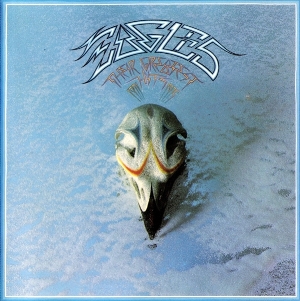
Their Greatest Hits (1971–1975) is the first compilation album by the American rock band the Eagles, released on February 17, 1976, by Asylum Records. The album contains a selection of songs from the Eagles' first four albums released in the period from the Eagles' formation in 1971 up to 1975.

Greatest Hits is the eleventh official album release for English musician Elton John, and the first compilation. Released in November 1974, it spans the years 1970 to 1974, compiling ten of John's singles, with one track variation for releases in North America and for Europe and Australia. It topped the album chart in both the United States and the United Kingdom, staying at number one for ten consecutive weeks in the former nation and eleven weeks in the latter.

Eric Howard Carmen is an American singer, songwriter, guitarist, and keyboardist. He was first known as the lead vocalist of The Raspberries. He had numerous hit songs in the 1970s and 1980s, first as a member of the Raspberries, and then with his solo career, including hits such as "All by Myself", "Never Gonna Fall in Love Again", "She Did It", "Hungry Eyes", and "Make Me Lose Control".
Pilot were a Scottish rock group, formed in 1973 in Edinburgh by David Paton and Billy Lyall. They are best known for their songs "January", "Magic", "Just A Smile" and "Call Me Round".
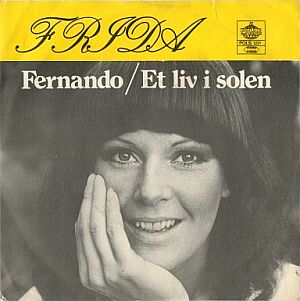
"Fernando" is a song written by Benny Andersson and Björn Ulvaeus, from the Swedish musical group ABBA. The song was written for their fellow group member Anni-Frid Lyngstad and was included on her 1975 album Frida ensam.

"I Write the Songs" is a popular song written by Bruce Johnston in 1975 and released on his album Going Public in 1977. Barry Manilow's version reached number one on the Billboard Hot 100 chart in January 1976 after spending two weeks atop the Billboard adult contemporary chart in December 1975. It won a Grammy Award for Song of the Year and was nominated for Record of the Year in 1977. Billboard ranked it as the No. 13 song of 1976.

"Bye, Bye, Baby " is a popular song written by Bob Crewe and Bob Gaudio, a member of The Four Seasons, whose version of the song made it to No. 1 in Canada and No. 12 on the US Billboard Hot 100 in 1965. On the original issue of the single, the title was "Bye Bye Baby"; on the album The 4 Seasons Entertain You, the name was changed to the longer, more familiar name. The song is about saying goodbye, not because the person is unloved but rather because the relationship is adulterous.

"Magic" is a 1974 song by Scottish pop rock band Pilot, and was the first hit single for the group. It was written by band members David Paton and Billy Lyall for their debut album, From the Album of the Same Name.
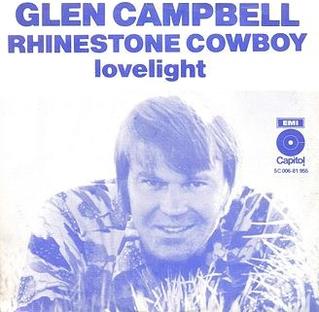
"Rhinestone Cowboy" is a song written by Larry Weiss and most famously recorded by American country music singer Glen Campbell. When released on May 26, 1975, as the lead single and title track from his album Rhinestone Cowboy, it enjoyed huge popularity with both country and pop audiences.
"Under the Moon of Love" is a song written by Tommy Boyce and Curtis Lee, and first recorded in 1961 by Curtis Lee. Produced by Phil Spector, Lee's recording was released on Dunes Records #45-2008, with the "B" side "Beverly Jean". It peaked on the Billboard Hot 100 at No. 46 on November 27, 1961.

"Love Will Keep Us Together" is a song written by Neil Sedaka and Howard Greenfield. It was first recorded by Sedaka in 1973. American pop duo Captain & Tennille covered the song in 1975, with instrumental backing almost entirely by “Captain” Daryl Dragon, with the exception of drums played by Hal Blaine; their version became a worldwide hit.

"Fly, Robin, Fly" is a song by German disco group Silver Convention from their debut studio album Save Me (1975). Sylvester Levay and Stephan Prager wrote the song, and the latter produced it. "Fly, Robin, Fly" was released as the third single from Save Me in September 1975, peaking at number one on the United States Billboard Hot 100. Thanks to the success of "Fly, Robin, Fly", Silver Convention became the first German act to have a number one song on the American music charts. The song received a Grammy Award for Best R&B Instrumental Performance in 1976.
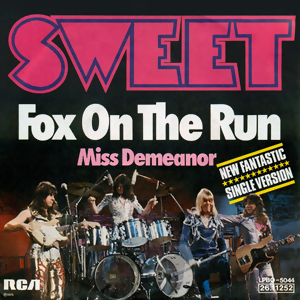
"Fox on the Run" is a song by the British band Sweet, first recorded in 1974. It was the first Sweet single written by the band, rather than producers Nicky Chinn and Mike Chapman, and was their 14th single overall. The song became the best charting single in Australia in 1975, with six weeks at number one.

"He Will Break Your Heart", is a song originally performed and co-written by Jerry Butler, a top-ten hit in 1960.

"Never Gonna Fall in Love Again" is a song co-written and recorded by American pop rock artist Eric Carmen. It was released as the second single from Carmen's self-titled debut solo album, the song peaked at number 11 on the US Billboard Hot 100 chart in June 1976, remaining in the Top 40 for ten weeks. The song reached number one on the Billboard Easy Listening chart. In Canada, it was a number-one hit on both charts.

"Heaven Must Be Missing an Angel" is a disco song written by Freddie Perren and Keni St. Lewis. It was recorded by the American band Tavares in 1976. It was released as a single from the album Sky High! and was split into two parts: the first part was 3 minutes and 28 seconds in length, while the second part was 3 minutes and 10 seconds. "Heaven Must Be Missing an Angel" was re-released in February 1986.

"Black Is Black" is a song by the Spanish rock band Los Bravos, released in 1966 as the group's debut single for Decca Records. Produced by Ivor Raymonde, it reached number two in the UK, number four in the US, and number one in Canada. With the recording's success, Los Bravos became the first Spanish rock band to have an international hit single. A dance remix was released as a single in 1986.
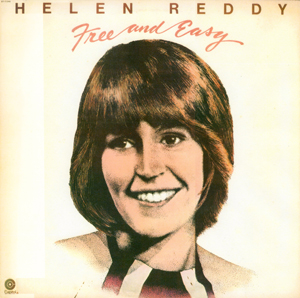
Free and Easy is the sixth studio album by Australian-American pop singer Helen Reddy that was released in the fall of 1974 by Capitol Records. The album included rare forays into rock and vaudeville ("Showbiz"). The album debuted on Billboard's Top LP's & Tapes chart in the issue dated November 2, 1974, and reached number eight during its 28 weeks there. The following month, on December 18, the Recording Industry Association of America awarded the album with Gold certification for sales of 500,000 copies in the United States. In the UK it peaked at number 17, and in Canada's RPM magazine it got as high as number nine on its list of the top LPs in the issue dated January 11, 1975. On January 27, 2004, it was released for the first time on compact disc as one of two albums on one CD, the other album being her other 1974 release, Love Song for Jeffrey.

















